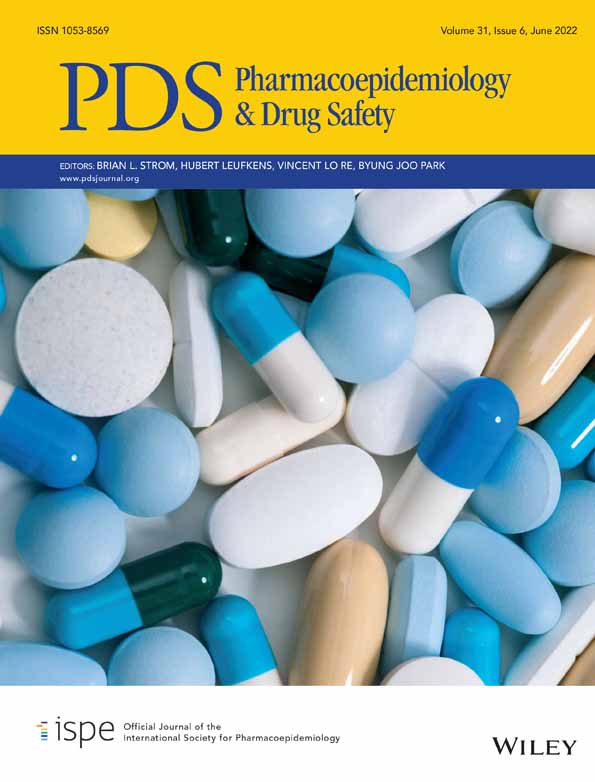Proton pump inhibitors may enhance the risk of citalopram- and escitalopram-associated sudden cardiac death among patients receiving hemodialysis
Funding information: National Institutes of Health; National Heart, Lung, and Blood Institute, Grant/Award Number: R01 HL152034
Abstract
Purpose
Polypharmacy is common in the hemodialysis population and increases the likelihood that patients will be exposed to clinically significant drug–drug interactions. Concurrent use of proton pump inhibitors (PPIs) with citalopram or escitalopram may potentiate the QT-prolonging effects of these selective serotonin reuptake inhibitors through pharmacodynamic and/or pharmacokinetic interactions.
Methods
We conducted a retrospective cohort study using data from the U.S. Renal Data System (2007–2017) and a new-user design to examine the differential risk of sudden cardiac death (SCD) associated with citalopram/escitalopram initiation vs. sertraline initiation in the presence and absence of PPI use among adults receiving hemodialysis. We studied 72 559 patients:14 983 (21%) citalopram/escitalopram initiators using a PPI; 26 503 (36%) citalopram/escitalopram initiators not using a PPI;10 779 (15%) sertraline initiators using a PPI; and 20 294 (28%) sertraline initiators not using a PPI (referent). The outcome of interest was 1-year SCD. We used inverse probability of treatment weighted survival models to estimate weighted hazard ratios (HRs) and 95% confidence intervals (CIs).
Results
Compared with sertraline initiators not using a PPI, citalopram/escitalopram initiators using a PPI had the numerically highest risk of SCD (HR [95% CI] = 1.31 [1.11–1.54]), followed by citalopram/escitalopram initiators not using a PPI (HR [95% CI] = 1.22 [1.06–1.41]). Sertraline initiators using a PPI had a similar risk of SCD compared with those not using a PPI (HR [95% CI] = 1.03 [0.85–1.26]).
Conclusions
Existing PPI use may elevate the risk of SCD associated with citalopram or escitalopram initiation among hemodialysis patients.
CONFLICT OF INTEREST
Magdalene M. Assimon has received investigator-initiated research funding from the Renal Research Institute, a subsidiary of Fresenius Medical Care, North America for unrelated projects, and honoraria from the American Society of Nephrology and the International Society of Nephrology. Patrick H. Pun has received investigator-initiated research funding unrelated to this project from Medtronic, honoraria from the American Society of Nephrology and the National Kidney Foundation, and consulting fees from Fresenius Kidney Care, North America, AstraZeneca, Janssen, Relypsa, and Ardelyx. Sana M. Al-Khatib has received research funding from Medtronic, Boston Scientific and Abbott. She has received speaking fees from Medtronic. M. Alan Brookhart serves on scientific advisory boards for American Academy of Allergy, Asthma, and Immunology; Amgen; Atara Biotherapeutics; Brigham and Women's Hospital; Gilead; Merck; National Institute of Diabetes and Digestive and Kidney Diseases (NIDDK); and Vertex. He receives consulting fees and owns equity in Target RWE. Wolfgang C. Winkelmayer has received honoraria for consultancy or scientific advice to Akebia/Otsuka, AstraZeneca, Bayer, Boehringer Ingelheim/Lilly, GlaxoSmithKline, Janssen, Merck, Pharmacosmos, Reata, and Relypsa. In the last 3 years, Jennifer E. Flythe has received speaking honoraria from the American Society of Nephrology and multiple universities, as well as investigator-initiated research funding unrelated to this project from the Renal Research Institute, a subsidiary of Fresenius Kidney Care, North America. She serves on a medical advisory board for Fresenius Kidney Care, North America and a scientific advisory board and Data and Safety Monitoring Committee for the NIDDK. She has received consulting fees from Fresenius Kidney Care, North America and AstraZeneca. Bradley N. Gaynes reports no conflicts of interest.




